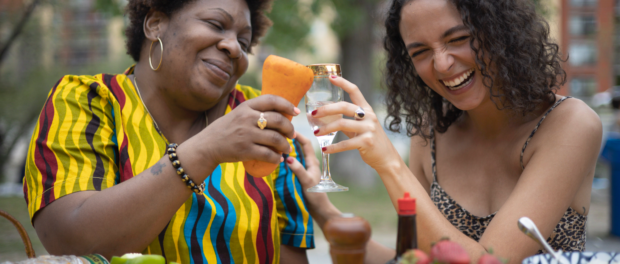Montreal Fringe With Feeling
The Montreal St. Ambroise International Fringe Festival is many things — exciting, crazy, joyful, celebratory. But this year’s Fringe has a poignancy to it, a feeling of relief that follows a long and trying ordeal. So while last year’s This is Not a Fringe definitely kept the fire burning through a long quarantine, it’s only now at the dawn of post-red-zone-life that we can assemble and see that we are still here. Celebrating it’s 30th year (or 30.5th?), the Montreal Fringe Festival has embraced what the Fringe’s Executive and Artistic Director Amy Blackmore calls “radical hospitality” to welcome back everyone at whatever point of re-entry they are at.
Blackmore explains the mood surrounding this year’s Fringe the best. “It’s an emotional time for me, for everyone, and not just cause the Habs are going to the second round. This moment now is special and it’s not lost on me how special this Fringe will be,” she says. “I keep crying every day. People want reconnection and people want to gather, especially our community.”
For the Fringe team, the goal has been to create as many possible entry points as possible, whether online or off. Multi-layered content that includes venue live shows, streaming on Fringe TV, recorded events, and podcasts, are available. Ticket sales speak volumes, with 12,000 tickets already sold on the day of the festival kick-off, the Fringe for All.
Some patrons of the arts have gotten used to watching events recorded in bedrooms, but others have waited for the return of live shows. Blackmore points out that even though Montreal venues have been welcoming audiences back since late March, many people haven’t gone yet whether that ties into vaccine rollout, social-distancing, fear, lack of awareness, or just limited capacity. The Fringe will be their first live show in a theatre in over a year. “I’m imagining the emotions are high for everyone, especially that moment, when someone who is able to finally sits down in the theatre and the show starts,” she says. This is all the more true since the Fringe is for many people their first exposure to theatre in Montreal. People who are uncomfortable in a formal venue often feel safe coming to the Fringe. “It’s an entry point for many,” Blackmroe says. “For those who are coming for the first time or who are coming back, it’s a big responsibility, and I’m nervously exciting about it.”
The Fringe team is going above and beyond to help everyone have a good experience. “Let us know what you need, so we can help,” says Blackmore. Among the things the team is doing as part of its “radical hospitality” is creating instructional videos to demystify what will happen when going to see socially-distanced live theatre, covering safety measures in place, how entering and exiting will happen, even how to create an account to see shows this year.
“We’re trying to find ways to reduce barriers whatever they are. This is a year to dig deep into that.”
So what is on offer this year? 154 shows, some of which will take place in the five live venues as well as streaming online. Some familiar faces are back: Nisha Coleman, Walter Lyng. From dance, keep an eye out for multidisciplinary company, Tuque et Capuche’s Bloom. Expect diversity, from comedy to drama to magic to storytelling to dance, in both French and English. “There are a lot of shows about mental health,” Blackmore adds when asked about the trends she sees this year, referencing a Beaverton parody article that warned of theatrical productions about COVID.
A very accessible aspect to the Fringe this year is its brand new bilingual podcast, Le Lab Fringebuzz / The Fringebuzz Lab. Episodes air Tuesdays in French, Thursdays in English, and include interviews with many familiar faces from the world of Montreal Arts and Culture, like Pat Donnelly and Mado. Among the episodes to listen for are an interview with original Montreal Fringe Festival founders, Kris and Nick Morra, who founded the Fringe in 1991 and wed in the 90s. Jamie O’Meara interviewed the two, nearly 30 years after speaking to them for a cover story for the Hour, and hadn’t connected with them since. Blackmore says that “Listening to them describe the Fringe, its importance and its mandate and why they founded it, it was like listening the current staff talk about the Fringe. That through-line remained 30 years later. It blew my mind. It is not curated. It is kept accessible. All those points are part of the Fringe now, 30 years on, and are more important than ever. I think that’s what created resiliency within our team and what’s allowed the Fringe to thrive and survive.”
“This year’s got nostalgia going on,” Blackmore adds. “It’s a nice reminder of who we are, what we’re doing, and why we’re doing it.”
So whether you’re interested in live or screened shows, music, dance, theatre, comedy, or other, the Fringe has you covered this year. Although the 13th Hour and Fringe After Dark are on pause, there are plenty of other events including panel discussions, and of course the awards ceremony, The Frankies, which will be available online. Festival pass holders get access to bonus contents, such as shorts by Bouge d’ici and more.
“Everybody is rearing to Fringe,” says Blackmore. “The vibe is a little calmer, but expect surprises.” Everyone has been invited to share memories of the past 30 years of Fringe with the hashtag, #FringeMTL, whether that is old articles, tickets, posters, photos, and old t-shirts.
Just a quick glance at Facebook and a search on socials with the hashtag #FringeMTL proves that the Fringe party for 2021 is on.
The Montreal Fringe Festival started June 1, with live performances taking place June 10-20. Streaming content is available until June 20. Tickets and passes can be purchased at montrealfringe.ca or by phone 514-849-FEST (3378). Keep an eye on the Fringepage and its Facebook page for updates.






